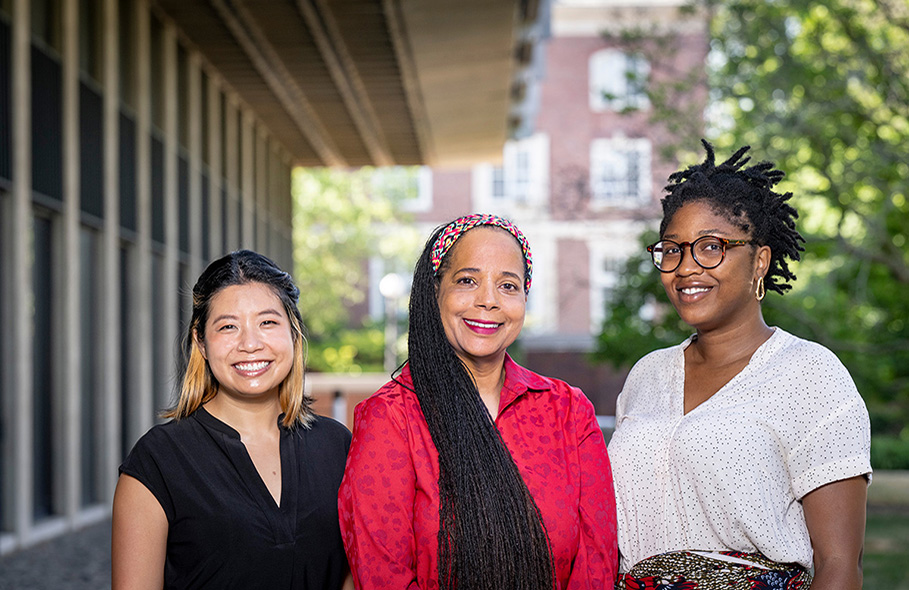Paper: Train Future Psychologists to Dismantle Racism, Injustice in Society
by Sharita Forrest, UI News Bureau / Aug 30, 2022

A team of psychologists, led by scholars at the College of Education, proposes a new training model that would prepare all practitioners in their discipline to respond to the social ills of racial discrimination and other forms of repression. The team includes, pictured from left, predoctoral candidate B. Andi Lee, educational psychology professor Helen Neville and doctoral intern Nimot Ogunfemi.
Comprised of scholars representing several universities, the team has created an anti-racist training model for psychologists that will prepare them to dismantle racism in society, as opposed to only teaching coping skills to individuals. The team is also calling upon the psychology discipline to acknowledge the racist theories and practices in its history and the inequities they created.
While the training, called the Public Psychology for Liberation model, was designed for public psychologists – those who work in public settings – the team says it would have universal benefit for everyone in their discipline, regardless of field.
In a recently published paper, the team outlined the new training paradigm, saying that it challenges the “anti-Blackness, racial oppression and myths of white supremacy” embedded in society and “built uncritically into our training and discipline.”
“We want to transform with whom, what and how we teach, research and write by centering on the people most marginalized in society and the experiences and topics that they want to research,” said Helen A. Neville, a professor of Educational Psychology at the University of Illinois Urbana-Champaign and the first author of the paper.
The model also represents a commitment to provide mental health services in the public sector to, by and with some of the society’s most oppressed people. Grounded in the principles of liberation psychology – which emphasize collective well-being, consciousness of social injustices and resistance to the normalization of discrimination and oppression – the PPL model has the potential to transform community members’ lives, the team said.
“It includes centering social problems and the concerns of the global majority in our work and engaging diverse communities in knowledge creation from the very beginning to the very end,” said U. of I. Educational Psychology assistant professor and co-author Nidia Ruedas-Gracia.
“Another part of public psychology is better communicating psychology knowledge. We have our journals that are oftentimes behind paywalls or embargoes, and we tend to keep that knowledge in this box and only open the door to certain people.”
Under the PPL model, psychologists and community members would codevelop and share relevant and accessible tools to promote healing and well-being, enabling marginalized populations to rise above systems of oppression and social isolation, according to the paper.
Historically, Western psychology – that practiced in North and South America and Europe – has “pathologized the individual” for the mental and emotional wounds inflicted by systemic racism, said co-author B. Andi Lee, a predoctoral candidate in clinical-community psychology.
“A lot of our treatments are so individually centered that they don’t take into consideration what might be causing unwellness,” Lee said. “People end up internalizing a lot of their struggles as ‘self-issues’ when really, they are natural responses to structural inequality and oppression. We end up teaching our clients to adapt to oppression rather than working to transform these surrounding conditions for liberation.”
Read the full story from the UI News Bureau...